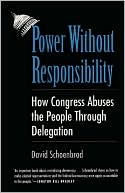Power Without Responsibility: How Congress Abuses the People through Delegation
Search in google:
A controversial work that attacks the system that allows Congress to delegate its legislative power to unelected administrative agencies and bureaucrats. Contending that delegation corrodes accountability, fails to produce effective public policy, and is unconstitutional, David Schoenbrod has written the first book that shows how delegation can be stopped. Kirkus Reviews Path-breaking study by Schoenbrod (Law/New York Law School) of the pernicious effect of Congress's delegation of power to various federal agencies. Schoenbrod argues that the provisions of Article I of the Constitution that invest legislative power in the Congress have been systematically subverted by Congressional delegation of power to agencies—a practice, he notes, that the Supreme Court rejected until the Court-packing controversy of the 1930's forced it to grant implicit permission. Moreover, he contends that from whatever ideological position one looks at such delegation, the result has been to subvert democratic government (and it's notable that the galley of this book carries blurbs from Americans both right—e.g., Robert Bork—and left—e.g., the president of the ACLU). Delegation has caused lawmakers to construct statutes of overwhelming complexity; to take credit for apparent solutions that solve nothing; to obtain political contributions for affected industries; and to blame agencies for inevitable failures. In one of several devastating case studies, the author analyzes how the orange- growers' cooperative, Sunkist, has used its political power to dominate the Department of Agriculture's marketing board; to exclude consumer interests; to prevent funds from being used to organize a referendum of all orange-growers (the majority of whom may be opposed to Sunkist's practices); and to prevent even a list of orange-growers from being released—all in the interest of the preservation of "orderly markets." Schoenbrod says that such abuses can be rectified—but that it's up to the Supreme Court to do so, by reigning in Congressional delegation and itsconsequent regulatory-agency fiascoes. He shows persuasively that Court action would help the public interest by reducing "a regulatory system so cumbersome that it needlessly stifles the economy, and so complex that it keeps the voters from knowing whom to hold accountable for consequences." An original and devastating analysis that may have considerable political impact.
PrefaceAcknowledgmentsPt. IIntroduction1The Nub of the Argument3Pt. IIEvolving Ideas of Delegation2The Vain Search for Virtuous Lawmakers25Pt. IIIDelegation in Practice3Broad Delegation: Regulating Navel Oranges494Narrow Delegation: Regulating Air Pollution585How Delegation Changes the Politics of Lawmaking82Pt. IVIs Delegation Good Policy?6Delegation Weakens Democracy997Delegation Endangers Liberty1078Delegation Makes Law Less Reasonable1199Congress Has Enough Time to Make the Laws135Pt. VThe Courts Should Bar Delegation10The Constitution Prohibits Delegation15511Why the Courts Should Stop Delegation (and Nobody Else Can)16512How the Courts Should Define Unconstitutional Delegation180Pt. VIConclusion13America Is No Exception195Notes199Index256








